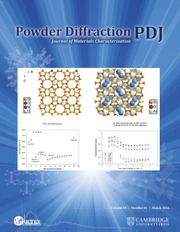Article contents
Synthesis, crystal structure, and X-ray diffraction data of lithium m-phenylenediamine sulfate Li2(C6H10N2)(SO4)2
Published online by Cambridge University Press: 13 April 2021
Abstract
A new organic–inorganic hybrid lithium m-phenylenediamine sulfate (LPS), Li2(C6H10N2)(SO4)2, was synthesized under aqueous solution conditions. The X-ray powder diffraction study determined that the title compound crystallized in a monoclinic system at 300 K, with unit-cell parameters a = 7.8689(6) Å, b = 6.6353(5) Å, c = 11.8322(10) Å, β = 109.385(3) °, V = 582.77(8) Å3. Indexing of the diffraction patterns collected from 100 to 600 K reveals that LPS has no structural phase transition within the measured temperature range, and the volume expansion coefficient is approximately 2.79 × 10−5 K−1. The crystal structure was solved based on the single-crystal diffraction data with space group P21/m. Lithium and SO42− are found to form quasi-two-dimensional anti-fluorite [LiSO4] layers stacking along the c-axis, with m-phenylenediamine molecules inserted in the anti-fluorite layers and forming hydrogen bonds to the SO42−. This explains a moderate anisotropic expansion in LPS.
Information
- Type
- New Diffraction Data
- Information
- Copyright
- Copyright © The Author(s), 2021. Published by Cambridge University Press on behalf of International Centre for Diffraction Data
References
- 1
- Cited by


